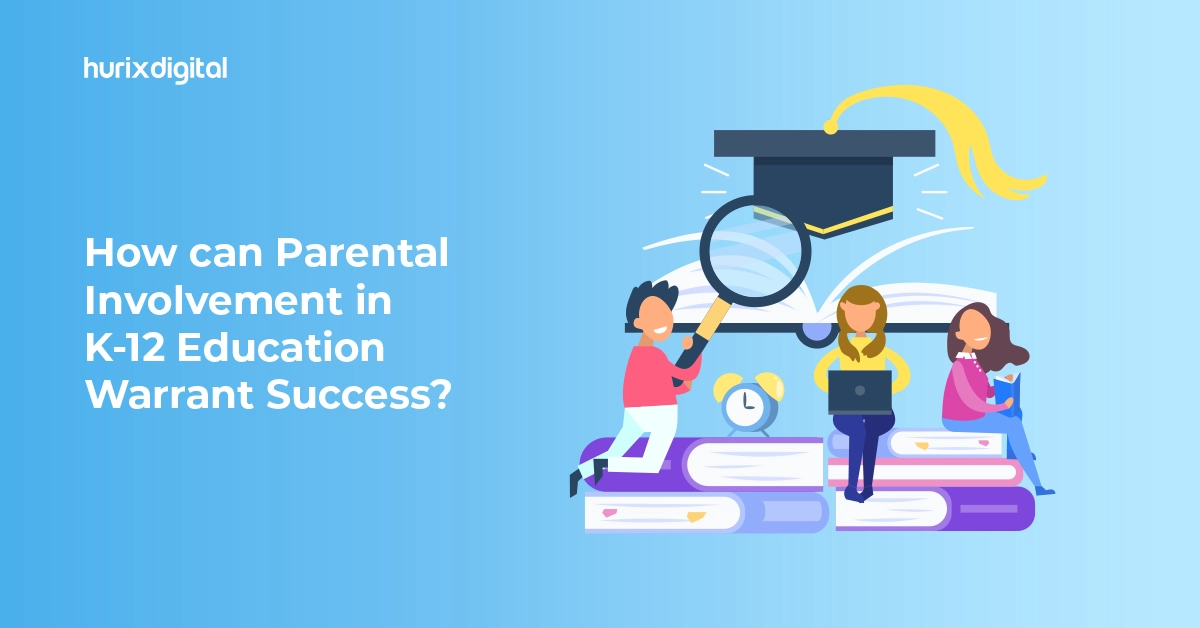
How can Parental Involvement in K12 Education Warrant Success?
Summary
The article highlights the critical importance of parental involvement in K-12 education. It suggests strategies for schools to enhance engagement and cultivating strong relationships between parents and the educational institutions their children attend.
Parents are a child’s first teachers and have the greatest influence on their lives. For this reason, parents’ involvement is crucial in a child’s academic life from kindergarten to 12th grade (K12).
And no, this doesn’t mean that parents need to attend parent-teacher meetings more often. There’s more to it, like helping kids with homework, supporting them to revise classroom studies, and even just guiding them through their emotions.
Parents need to stay involved throughout a child’s educational journey. Once they notice their role in their kids, they can help them become great human beings. However, most schools struggle to involve parents in their children’s education. This might be due to a lack of understanding of the concept and its relevance or even wrong strategies.
So, if you want to overcome the challenges and encourage parents to step forward, let’s get started!
Table of Contents:
- What is Parental Involvement? Why is it Important?
- Strategies to Enhance Parental Involvement in K12 Education for Schools
- Conclusion
What is Parental Involvement? Why is it Important?
Parental involvement is the active participation of student’s parents or guardians in their school activities. This might be helping them with homework, extracurricular activities, or community events.
Parental involvement has several benefits in a child’s life, as follows:
1. Reduces Absenteeism
Absenteeism negatively affects a child’s social and emotional skill development and academic performance. It also leads to dropouts and severe consequences, like poor income and unemployment.
Parental involvement ensures children are physically and mentally healthy, leading to less absenteeism.
2. Enhances Good Behavior
When parents are involved in their children’s academics, it improves their self-esteem and attitude toward school and reduces disobedience. This helps them maintain healthy relationships at school.
3. Students Can Achieve More
Studies show that higher parental involvement helps students have higher scores in all subjects than students with low parental involvement.
Also Read: Ethical Considerations of AI in K12 Education: Navigating the Future of Learning
Strategies to Enhance Parental Involvement in K12 Education for Schools
To ensure better involvement of parents in their children’s academics in your school, follow these strategies:
1. Establish Steady and Open Communication Through Specific Channels
Educators and school staff must build a long-term and meaningful connection with students’ parents. To do this, you must first pick a specific communication channel or platform.
If different teachers choose different tools, parents will get confused and overwhelmed. They might even miss important information if they have to keep up with too many channels.
The school authorities must pick one tool or channel. These can be emails, text messages, social media, or the school website/bulletin. Ensure the tool is available to parents. Set particular protocols for using it and train educators accordingly.
Some more tips to ensure clear and open school communication with parents are:
- Staff must avoid buzzwords and jargon when communicating with parents. Keep the language simple to ensure all parents understand the information clearly.
- Share regular updates to parents and guardians through chosen communication channels.
- Host parent-teacher meetings regularly to share children’s academic progress. Ask them to identify their children’s strengths and weaknesses and discuss them with teachers to find solutions.
- Don’t arrange for hours-long meetings to share all the information at once. Frequent and short communication is more effective.
- Ensure parents can also raise concerns and share feedback through chosen tools. Authorities must make the parents feel heard.
2. Educate Students’ Parents
Students’ parents may not know about the impact of parental involvement on children’s academic success and achievements. It might be because they never got similar attention or lack the knowledge.
So, guide parents on this by sharing the benefits of their involvement. You can also offer them some tips on how to get involved slowly and naturally. You can plan a workshop and share these details. While you’re at it, cover these topics as well:
- How to build a comfortable learning environment at home?
- How to track children’s academic progress?
- How to encourage children to build positive study habits at home?
- How to help children build academic goals?
If parents are not available for or disregard workshops, lure them in with special incentives. These can include a special prize for their children or even complimentary snacks.
If there are working parents who can’t attend the workshop in person, offer an online discussion as well. If parents are still not available, share educational games and books, interactive tools, and online apps to help parents learn about parental involvement.
3. Build an Inclusive School Environment
Parents are more likely to be involved in children’s studies when they feel like a part of a community. You can establish this sense with the following tips:
- Encourage parents/guardians to have a say in decisions. After every meeting and decision-making process, ask them if anyone has any concerns or if they have a better alternative.
- If any parents don’t speak English, offer them translation services. Otherwise, they won’t be able to keep up and won’t get involved in children’s education and meetings with teachers.
- Host orientation sessions for parents/guardians of new students.
- If any parents have hearing or visual disabilities, convey information to accommodate them. For instance, send an audio message to a person with visual issues. Share written materials or communicate in sign language for parents who are hard of hearing.
4. Plan Activities That Require Parental Involvement
Tailor school activities that require parents to collaborate with children. Here are a few ways to ensure parental involvement in learning activities:
- Create homework that needs parents’ presence. For instance, ask them to visit a museum, science fair, or educational venue, write about what they learned there, and take pictures with their parents.
- Arrange for school events like book fairs, science exhibitions, and art shows where both children and parents must participate together.
- Plan school trips where both parents and children must go. However, don’t exclude children if their parents can’t make it.
- Offer special prizes to parents who actively and steadily get involved in children’s academies.
- Host workshops on school safety and children’s health where both children’s and parents’ attendance is mandatory.
Besides these, seek parents’ suggestions on the type of activities they’ll willingly join.
5. Encourage SEL Activities at Home
Help parents get involved in social-emotional learning (SEL) activities to build a supportive environment for children. Some tips to ensure that are:
- Organize in-person or online workshops to help parents learn about the SEL concept and relevant activities and strategies. This will help them support their kids’ social and emotional development at home.
- Create homework on goal-setting, empathy practicing, and reflecting on emotions. Specifically, mention that parents must work on it with children.
- Encourage projects where parents and children can participate in community service together to build empathy in children.
6. Ensure a Positive Relationship Between All Parties
School authorities and educators must eliminate any fear in parents’ minds. Convey that if parents can’t be present in all workshops or activities, the children won’t get bad scores.
Generally, parents dread calls from school, thinking their kids did something wrong. To erase such negative feelings, share positive news, like their children’s improvement, more often.
Remind parents to use a positive tone with their children. Even when they teach children, they must emphasize the good and never scare them or compare them with peers. This will make children look forward to parental involvement as well.
Also Read: 7 Best Education Tech (EdTech) Companies for K12 Institutes in 2024
Conclusion
Parental involvement in K12 academics offers great support for their educational, professional, and personal lives. So, start implementing the outlined strategies and highlight the importance of parents’ presence and guidance. This will help you make a huge difference in students’ lives.
Together, educators and parents can become a team, play a substantial role in shaping the upcoming generations, and set them up for success! Hurix Digital offers a comprehensive suite of learning solutions designed to boost student achievement and empower parents to be active partners in their child’s education.
Contact us today to learn more about our solutions and how we can help your school thrive!









